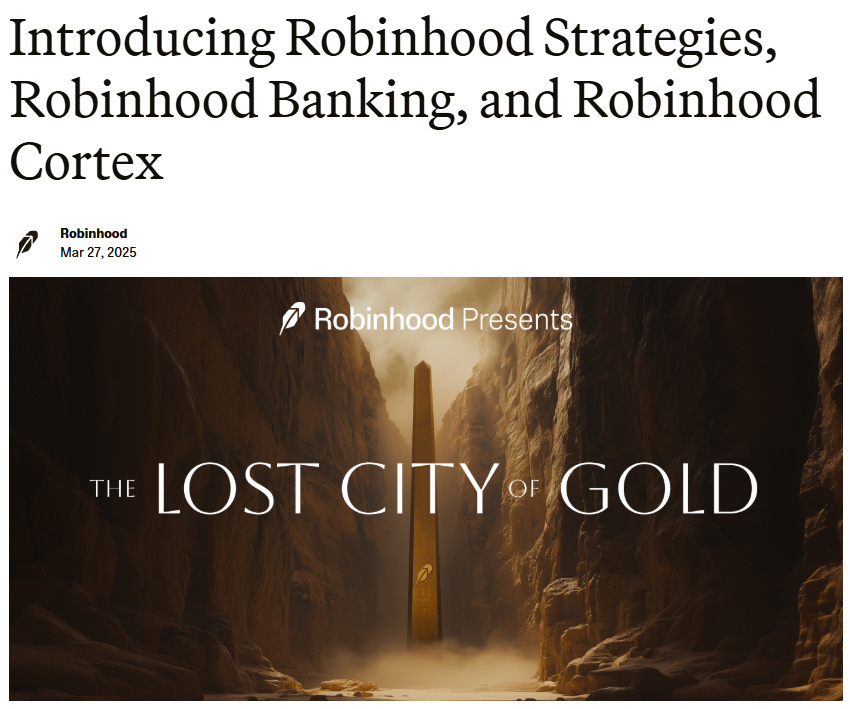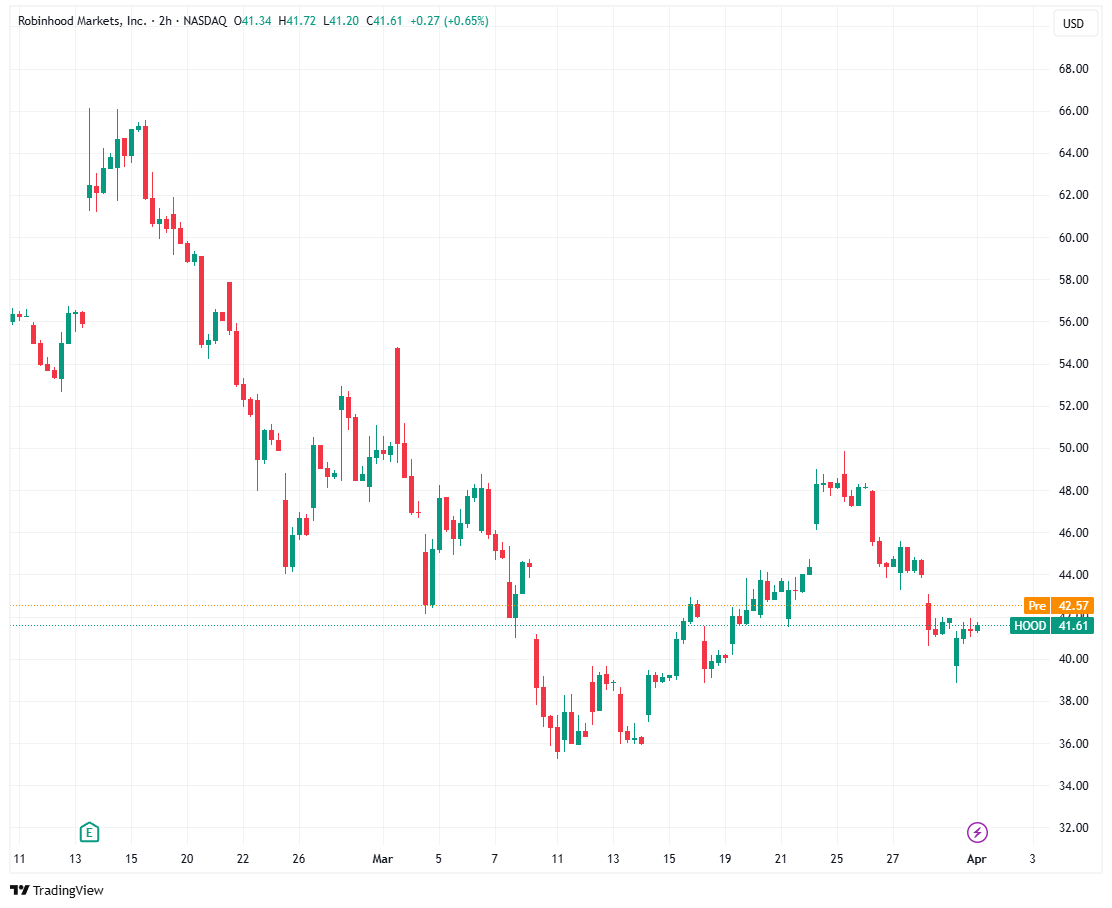Hello y’all. Happy Tuesday.
The brokerage known for democratising stock trading has transformed into a digital assets heavyweight and is beating crypto players on their playfield.
It’s not been an overnight turnaround for Robinhood, which reported a 7x year-on-year surge in cryptocurrency revenue in Q4 2024, reaching $358 million. That was about 40% of its total quarterly revenue.
Last week, Robinhood launched three products that made analysts double their target price. The company that once epitomised commission-free stock trading is now showing how seamlessly a business can adapt and transform itself by betting its future on digital assets. Plus, it’s making all this happen in the face of obstacles.
In today’s edition, we look at:
How a retail stock trading app pivoted to become a major digital assets player
Why Wall Street analysts are setting price targets as high as $105
The regulatory challenges emerging from Robinhood's prediction markets
What this hybrid model means for pure-play crypto exchanges
Whether traditional finance is beating crypto natives at their own game
Special Deal for Traders: Big Funds, Bigger Profits!
Tired of trading small? What if you could trade with serious capital — without risking your own? That’s where Propexito comes in.
Here’s the deal
Pass the challenge & prove you’ve got the skills
Get funded and trade with Propexito’s capital
Keep up to 90% of your profits—because you earned it
TTD exclusive: 20% off your challenge with code TTD20
No more excuses. No more small trades. Just pure profit potential.
Grab your 20% discount & start trading with Propexito!
From Stocks to Sats
Robinhood's entry into cryptocurrency wasn't an overnight decision. The company first added Bitcoin and Ethereum trading to its platform in 2018, but what began as a supplementary offering has evolved into a cornerstone of its business strategy.
Unlike pure-play crypto exchanges that had to build their user base from scratch, Robinhood leveraged its existing millions of retail stock traders.
This integration strategy has paid off dramatically.
In Q4 2024, Robinhood's crypto trading volume swelled to $70 billion, a 400% increase year-over-year.
Read: What’s Cookin’ at $COIN and $HOOD? 🧿
Get 17% discount on our annual plans and access our weekly premium features (HashedIn, Wormhole, Rabbit hole and Mempool) and subscribers only posts. Also, show us some love on Twitter and Telegram.
The Triple Play
Robinhood’s not content with its transformation from a stock broker to a hybrid player handling crypto on top of the Wall Street trading.
Last week, it unveiled three new products - Robinhood Strategies, a wealth management service charging 0.25% annually (capped at $250) for Gold subscribers; Robinhood Cortex, an AI-powered research assistant; and Robinhood Banking, which will offer checking and savings accounts with same-day cash delivery.
The banking service has drawn particular attention for its unconventional approach, offering physical cash delivery "the same way you'd want to order an Uber or a Postmates," said CEO Vlad Tenev during Wednesday's livestream presentation.
Bernstein analysts called it "Schwab elite banking but for everyone." Robinhood aims to "capitalise on the impending $114 trillion great wealth transfer" to younger generations, the analysts said in a note shared with Decrypt.
Three services, one common goal - to bring services traditionally reserved for the ultra-wealthy to the average investor.
Robinhood's $5 monthly Gold subscription has become a key driver in its broader strategy, approaching 3.2 million members after nearly doubling in 2024. This subscription service offers a 4% yield on uninvested cash, a 3% IRA contribution match, and now serves as the gateway to the company's new wealth management and AI research tools.
From Brokerage to Crypto to DeFi
These launches came barely 10 days after the company introduced prediction markets for March Madness basketball games in partnership with Kalshi, a CFTC-regulated prediction market. The rapid-fire expansion shows a company aggressively diversifying beyond its original business model.
Robinhood's recent moves signal an expansion far beyond simple crypto trading. Its March 17 launch of prediction markets, in partnership with Kalshi, marks its foray into a new asset class that blends both traditional finance and cryptocurrency speculation.
The prediction markets initially focus on March Madness basketball tournaments and Federal Reserve interest rate decisions, allowing users to place wagers on real-world outcomes. While Robinhood hasn't confirmed whether these contracts can be denominated in cryptocurrency, the company's simultaneous expansion in both areas suggests a potential convergence.
This move hasn't come without regulatory friction.
Massachusetts Secretary of State Bill Galvin subpoenaed Robinhood last week regarding its prediction markets, expressing concern that the platform was "linking a gambling event on a popular sports event that's especially popular to young people to a brokerage account."
New Jersey's Division of Gaming Enforcement went further, issuing a cease-and-desist order on Thursday requiring both Robinhood and Kalshi to stop offering sports-related prediction markets to New Jersey residents and void existing wagers from people living in the state.
"This letter shall serve as official notice that Robinhood [and Kalshi], by facilitating and/or accepting unauthorised sports wagering from individuals within the State of New Jersey, is engaging in activity that is unlawful under not only New Jersey law, but New Jersey's Constitution," wrote NJGDE Interim Director Mary Jo Flaherty.
Read: Prediction Markets Face Regulatory Crackdown
Wall Street's Vote of Confidence
Analysts think Robinhood's crypto-forward strategy is being under-valued.
Bernstein recently raised Robinhood’s stock price target to $105, more than double its current trading price of around $45. This would value the company at about $95 billion — placing it in the same league as CME Group.
This came just a week after Compass Point analysts initiated coverage of Robinhood with a $61 price target.
"HOOD's crypto business has underearned for its size after taking a cautious approach to U.S. product expansion," Compass Point analysts wrote in a March 20 note shared with Decrypt.
They estimated that Robinhood's crypto revenue was "just 19% of exchange giant Coinbase's non-interest revenue," suggesting significant room for growth.
Regulatory Navigation
Robinhood's rapid expansion into crypto and prediction markets is happening in the face of the regulatory turbulence.
On March 7, the company agreed to pay $29.75 million to settle several investigations by the Financial Industry Regulatory Authority (FINRA) related to supervision and compliance practices, including Anti-Money Laundering failures.
This settlement follows a larger $45 million agreement with the SEC in January over violations of more than 10 securities law provisions. That was followed by SEC's February decision to drop its investigation into Robinhood Crypto marked a significant victory.
"Any case against Robinhood Crypto would have failed," Dan Gallagher, Robinhood's Compliance and Corporate Affairs Officer, stated following the SEC's decision. "We appreciate the formal closing of this investigation, and we are happy to see a return to the rule of law and commitment to fairness at the SEC."
This regulatory clarity has allowed Robinhood to accelerate its crypto expansion.
Since the start of Q4 2024, the company has added seven new crypto assets in the US market and launched Ethereum staking in the EU.
The company has even begun supporting popular tokens like SOL, ADA, XRP, and memecoin PEPE following Donald Trump's election victory.
Token Dispatch View 🔍
Robinhood's transformation from stock app to crypto powerhouse reveals a surprising truth about the digital asset revolution: traditional financial players may be better equipped to mainstream crypto than the pioneers who built the industry.
While crypto purists focused on building decentralised alternatives to the financial system, Robinhood simply integrated digital assets into a platform millions already trusted. The result? A 700% surge in crypto revenue that now accounts for nearly 40% of its business, accomplished without alienating regulators or scaring away mainstream users.
This hybrid model exposes a fundamental tension in crypto adoption.
Pure-play exchanges built impressive technology but struggle with regulatory compliance and mainstream accessibility. Meanwhile, Robinhood leveraged its regulated status, familiar interface, and existing customer relationships to bring crypto to people who would never download a specialised exchange app.
Robinhood's success has also brought with it Wall Street's enthusiastic response. When analysts at Bernstein set price target as high as $105, they're endorsing the view that crypto's future lies in integration with traditional finance, not replacement of it.
The irony shouldn't be lost on crypto natives. After years of building alternative financial systems, the most effective on-ramp to digital assets might be through the very institutions the industry set out to disrupt. Robinhood's prediction markets, AI tools, and same-day cash delivery suggest a future where the lines between traditional and crypto finance blur completely.
The digital asset industry has to ponder if tomorrow's crypto giants will come out of today's exchanges, or will they be traditional financial players who successfully integrate blockchain technology? If Robinhood's trajectory is any indication, the answer may not be what crypto purists hoped for.
Token Dispatch is a daily crypto newsletter handpicked and crafted with love by human bots. You can find all about us here 🙌
If you want to reach out to 200,000+ subscriber community of the Token Dispatch, you can explore the partnership opportunities with us.
Fill out this form to submit your details and book a meeting with us directly.
Disclaimer: This newsletter contains sponsored content and affiliate links. All sponsored content is clearly marked. Opinions expressed by sponsors or in sponsored content are their own and do not necessarily reflect the views of this newsletter or its authors. We may receive compensation from featured products/services. Content is for informational purposes only, not financial advice. Trading crypto involves substantial risk - your capital is at risk. Do your own research.














